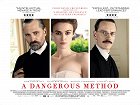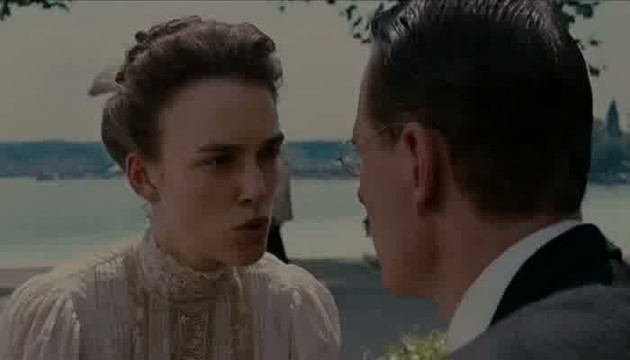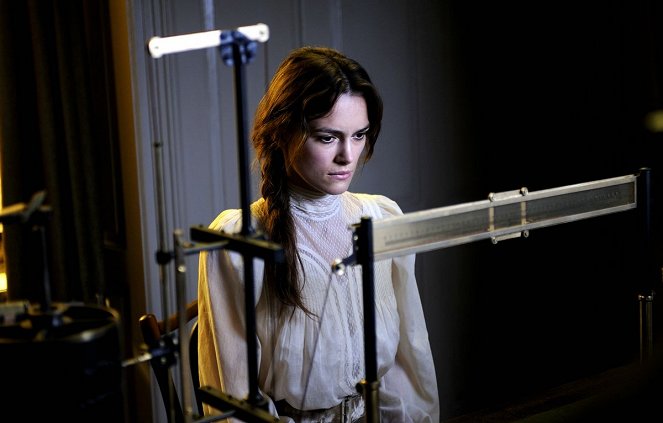Directed by:
David CronenbergCinematography:
Peter SuschitzkyComposer:
Howard ShoreCast:
Michael Fassbender, Keira Knightley, Viggo Mortensen, Vincent Cassel, Sarah Gadon, Katharina Palm, André Hennicke, Arndt Schwering-Sohnrey (more)VOD (4)
Plots(1)
David Cronenberg directs this drama based on the relationship between the two founding fathers of psychoanalysis, Sigmund Freud and Carl Jung. The film, which draws from both the stage play, 'Taking the Cure', by Christopher Hampton and the 1993 book, 'A Most Dangerous Method', by John Kerr, also portrays Jung's sexual affair with one of his female patients. Set in early 20th century Europe, the film traces the intense personal and professional relationship between Freud (Viggo Mortensen) and his protégé, Carl Jung (Michael Fassbender). When married family man Jung takes in beautiful young Russian patient Sabina Spielrin (Keira Knightley) for treatment at his clinic in Switzerland, she quickly becomes his muse and the two soon embark on a passionate sadomasochistic affair. Meanwhile, Freud and Jung's views and theories are developing in opposing directions, eventually leading to an insurmountable rift between the two. (Lionsgate UK)
(more)Videos (21)
Reviews (12)
A rather logical step (forward) in Cronenberg's filmography. From practice, i.e. obscure, low-budget independent horror movies (Shivers, Rabid, The Brood), and obscure, bigger-budget horror movies (Videodrome, The Dead Zone, The Fly), the director worked his way up to theory and started making polished dramas with capital from major Hollywood studios. The subversiveness of the earlier metaphysical body horror movies (a genre for which he holds the copyright) has not disappeared from his more recent films, but it is more artfully hidden and thus all the more dangerous. Just like the dark ideas. Safely tucked away in our subconscious until two gentlemen began to ferret them out at the beginning of the 20th century. Contemporary observers perceived the method employed by the fathers of psychoanalysis as talk therapy. Patients talked; Freud and Jung listened. The Dangerous Method adopts this approach, but with the difference that Freud and Jung talk through most of the film while we listen. Cronenberg’s favourite themes of sexual repression and the destructive power of sexual desire are addressed using a straightforward yet refined vocabulary and subtle hints. The most fascinating development takes place in the case of the father-son relationship between two men for whom each other’s existence gradually becomes both a driving force and something that they would rather deny. In the spirit of the axiom that a doctor must get sick in order to know what illness he is treating, The Dangerous Method is a clinical study of an unorthodox love triangle. The base of that triangle is Jung, a man with an admirable appetite who, with regard to others, does not place restrictions on himself either in terms of food (with Freud’s family at the table) or in terms of sex (he clearly feels no remorse for his infidelity). More than for himself, this egoism is thus destructive for the other two crucial people in his life, i.e. for Sabina, who undergoes a convincing transformation from a patient to a doctor (see the first and last shots of the film), which is critical for the plot, as well as for Freud. We peculiarly see Jung with them only on the boat that his wife gives him. For viewers who are familiar with basic psychoanalytical concepts, the comprehensibly composed Freudian symbolism provides a guide for finding one’s bearings in the labyrinth of desires that the characters allow themselves to be controlled by (Otto Gross, libido personified, could be Jung's unbridled id, whereas the authoritative Freud represents his restrictive superego). The Dangerous Method is a drama that is thoroughly well thought out on at least two levels, where the upper level – understanding – reveals the director’s mastery of the classic narrative style. No editing goes to waste, the composition of the shots is impressively economical thanks to the great depth of field, the placement of the characters in space reflects the relationships of voluntary and forced subordination and dominance between them, the narrative is fluid and focused, and the intertwining of the romantic and professional storylines is almost perfect. With this film, I believe the Canadian eccentric has advanced to the category of great directors. 85%
()
(less)
(more)
I would expect some wild in the form of decapitated heads or at least explicit sexual creations from David Cronenberg, but there is nothing like that in this film. Well, there is a certain effort towards the latter, but it's more of an artistic walk around it rather than something happening. So, as viewers, we're left with nothing else but to rely on the superb performances, the sensitive film aesthetics, the excellent period setting, and exceptionally well-handled psychology, skillfully transferred onto the big screen. When philosophical debates don't come across as boring or complicated, but quite the opposite, and they even have some pretty excellent points. It's just that the whole thing feels a bit cold and too overly contrived.
()
Cronenberg gives a brief insight into the core ideas of Freud and his pupil Jung in an audience-friendly and simple form, which is a rare and welcome gift compared to complexly worded lectures on psychoanalysis or literary scholarly attempts to interpret their work. Yet, thanks to the breathtaking performances of all three leading characters and the masterfully written dialogues that often provide a hidden point, I find Cronenberg's film also attractive for the audience.
()
I would gladly play with Miss Spielrein and smoke a cigar with Freud, but I’d rather sit down by Lake Zurich than take a part in his long-winded dialogues with the malleable and indecisive Jung. Viggo Mortensen is great and the visual esthetics delicious, but there are no emotions. A film where mainstream stars recite phrases only a few viewers will understand. Compared to this, Polanski’s Bitter Moon was far more poetic and passionate in its testimony about the dark corners of human sexuality.
()
That Cronenberg is in there. It lies concealed in Keira Knightley's nipple crawling out of her corset, Vincet Cassel's face, the subversive dialogue, and especially the character of Jung (who has a lot of points of contact with James Woods' character from Videodrome), but it's littered with tons of costumes and understated studio work, and somehow lacks a significant personal investment. Otherwise, Viggo Mortensen is incredible! PS: Keira Knightley is cast brilliantly and Cronenberg takes advantage of all her physical imperfections (breasts, British-sharp physiognomy, arched forehead, prominent chin, a figure that generally begs for professional help) and makes the actress accentuate them
()


